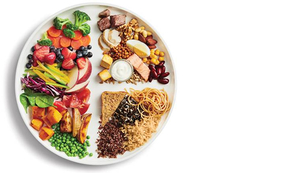Discover 8 simple healthy eating tips that help you balance energy, feel your best, and support long-term wellness with easy, practical advice.
Eating healthy doesn’t have to be complicated. Whether you want to lose weight, feel more energized, or support your long-term health, making smart food choices every day makes a big difference. This article offers practical healthy eating tips to help you feel better and live stronger without giving up your favorite meals.

Many people in the U.S. struggle with knowing where to begin. These 8 healthy eating tips will guide you step by step to build better habits that last.
1. Base Your Meals on High-Fiber Starchy Carbs
Carbohydrates give your body energy, but choosing the right kind matters. Go for whole grains like brown rice, wholewheat pasta, and potatoes with their skins. These are higher in fiber and help keep you full longer.
Quick tip: Add brown rice or wholegrain bread to your lunch or dinner. These carbs are part of a healthy eating plan that supports digestion and keeps energy levels steady.
2. Eat More Fruits and Vegetables
One of the easiest healthy eating tips is to load up on colorful fruits and veggies. Aim for at least five servings a day. They’re packed with vitamins, fiber, and antioxidants that boost your immune system and overall health.
Try this: Toss berries into your oatmeal or snack on bell pepper strips with hummus. Frozen, fresh, or canned all options count!
3. Add Fish to Your Meals (Especially Oily Fish)
Fish is rich in protein and essential fats. Eating oily fish like salmon or sardines at least once a week helps protect your heart and brain.
Simple swaps: Use canned tuna or grilled salmon in wraps and salads. It’s an easy way to stick to healthy eating without extra fuss.

4. Cut Down on Saturated Fat and Sugar
Healthy eating also means being mindful of what you avoid. Too much saturated fat and sugar can increase your risk of heart disease and weight gain.
Watch out: Many packaged foods like cookies and sugary drinks are loaded with hidden fats and sugars. Choose olive oil instead of butter, and reach for fresh fruit when you want something sweet.
5. Watch Your Salt Intake
Too much salt raises blood pressure and puts extra strain on your heart. Most salt comes from processed foods like canned soups and sauces.
Quick tip: Read labels and look for products marked “low sodium.” Cooking at home gives you more control and helps support your healthy eating goals.
6. Stay Active and Keep a Healthy Weight
Exercise works hand in hand with healthy eating. Regular movement helps you maintain a healthy weight, boost your mood, and reduce the risk of chronic diseases.
Start small: Take the stairs, stretch daily, or walk around the block after dinner. Pairing physical activity with good nutrition supports lasting wellness.

7. Drink Enough Water
Healthy eating isn’t just about food it includes staying hydrated. Water helps with digestion, skin health, and energy levels.
Hydration tip: Aim for 6 – 8 glasses of water a day. Avoid sugary sodas, and try adding lemon or cucumber to your water for a refreshing twist.
8. Don’t Skip Breakfast
One of the most overlooked healthy eating tips is to eat breakfast. A balanced breakfast fuels your morning and prevents unhealthy snacking later.
Try this: Wholegrain cereal with low – fat milk and a banana or a boiled egg with toast. Breakfast sets the tone for a strong, healthy day.
Final Thoughts
Healthy eating is all about small, consistent choices that add up. These 8 healthy eating tips are easy to follow and fit into any lifestyle. Whether you’re cooking for your family, prepping meals on the go, or just trying to feel better day to day, you have the power to make it happen.
You don’t have to be perfect. Just be consistent, and your body will thank you.
FAQs
1. What are the best healthy eating tips to start with?
Begin by drinking more water, eating more veggies, and cutting back on sugary snacks.
2. How often should I eat fish for a healthy diet?
Try to eat fish twice a week, including one serving of oily fish like salmon or mackerel.
3. Can I still eat carbs if I want to eat healthy?
Yes! Wholegrain carbs like brown rice and oats are part of a balanced, healthy eating plan.
4. How do I know if a food is high in sugar or salt?
Check the nutrition label. Look for foods with less than 5g of sugar or 0.3g of salt per 100g.
5. Do I need to skip meals to lose weight?
No, skipping meals can lead to overeating. Focus on regular, balanced meals to support healthy eating and weight management.

Pingback: Is Depression a Chemical Imbalance? What Science and Experience Really Say »